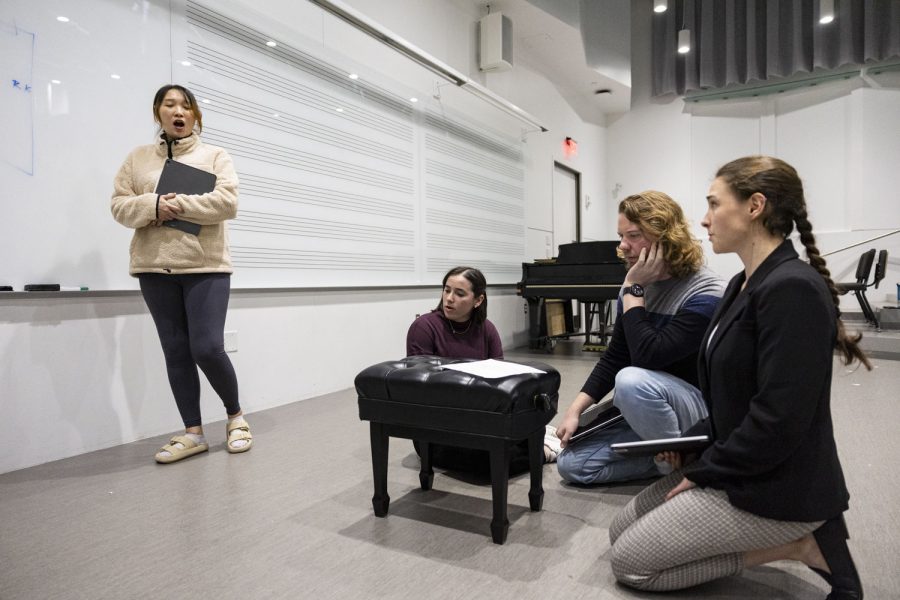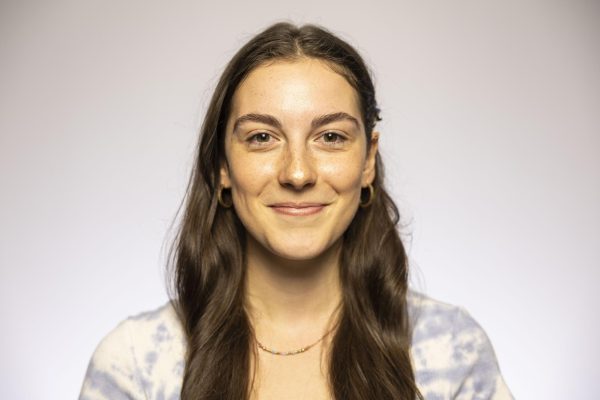Stanley Museum to host Nathan Felix’s immersive opera ‘The Great Flood’
On Thursday, April 27, Nathan Felix’s immersive opera about the Iowa flood of 2008 will premiere at the UI’s Stanley Museum of Art, relaying powerful stories surrounded by audiences and artwork.
Siyeon Kim, Rachel Kobernick, Nathan Brown, and Jordan McCready perform during a dress rehearsal of the opera “The Great Flood” at the Voxman Music Building on Monday, April 24, 2023. Nathan Felix is the composer of the opera and it will premiere at the Stanley Museum of Art on Thursday, April 27.
April 25, 2023
Angelic voices will rise above trembling violins and envelop the audience gathering in the galleries of the Stanley Museum of Art this week.
Nathan Felix will present “The Great Flood” on Thursday at the University of Iowa’s Stanley Museum, an immersive opera about the 2008 flood of Iowa City and how it impacted the community.
Felix is a New York City-based Mexican American composer and experimental filmmaker. His work is internationally recognized and said his work tends to focus on telling Latinx and minority stories. He transitioned from playing in an indie-rock band to composing classical music about 10 years ago.
Over the past four years, Felix explored themes of water in his work, particularly how bodies of water can behave like borders. This has led him to compose immersive operas like “Borderland,” which is about the roots of immigration across the Rio Grande River in Texas, and “Rivers Unite: Divide” in New York in 2021.
“It’s a great way to go into a community and have greater context for the community because, in each different city or community, there are different zones or areas or borders or varying social groups, so we can all identify with it on a micro level,” Felix said.
Felix reached out to the Stanley Museum after hearing about its reopening for the first time and learned about why it had to shut down in the first place. He began writing the opera’s story in fall 2022 and finished the project in as soon as six to eight weeks.
The conductor of the piece Alex Arellano joined the project when it was introduced to himself and his studio at the School of Music. Arellano is a second-year graduate student studying conducting with the UI Campus Symphony Orchestra.
Arellano was intrigued by the project because he was not familiar with immersive opera or the history of Iowa City’s experiences with flooding.
“Not being from this area, you hear a lot of those things and it’s kind of like hearing about mythology, which is funny approaching a project like this where I approach it with the sense that I wasn’t there. I didn’t see it firsthand,” Arellano said. “So, in my head, it’s like this mythos.”
Arellano is excited to see how the opera will interact with the space at the Stanley Museum and the artwork installed there.
The opera is composed of six chapters and follows the lives of two different families over several years. One is a married couple with a child on the way, and the other is a pair of sisters. Both families face the effects of Iowa City’s devastating floods and environmental changes.
Rachel Kobernick plays Radcliffe, the wife of Mortimer, who is played by Nathan Brown. Kobernick is a first-year student studying opera at the Cincinnati Conservatory of Music. She had also not heard of the Iowa floods until encountering the project but believes it is a great opportunity to connect with the community.
“I’m really excited about doing a project that’s so immersed in the community because that’s one of my favorite things to do,” Kobernick said. “That really allows us to use these projects to introduce new opera audience members, people who haven’t seen the art form before.”
The two sisters, Santangella and Zira, are played by Siyeon Kim and Jordan McCready respectively. According to McCready, her character is the vicarious younger sibling who is more socially conscious than her sister.
McCready is a senior studying vocal performance and psychology at Drake University and will pursue opera performance at the San Francisco Conservatory of Music. The mezzo-soprano loves the environmental awareness of the piece and appreciates the accessibility of the opera.
“It’s very easy to figure out where we’re at in the music, but I think that’s kind of cool because then it allows the singer to play around with text and the story, as well as different vocal timbres and sounds a little bit more,” McCready said. “I like how more simple music gives you the opportunity to play around with those other qualities.”
The stories of these families are tightly intertwined and bounce off each other, connecting and transitioning directly through the music. Controlled dynamics and minor chords will effectively communicate the intensity of the piece, especially when sounds blend or clash in powerful cacophonies.
The skilled singers will bring rich and exquisite harmonies to the opera with diverse ranges, their vocals enhanced by the haunting, yet beautiful music played by a small string ensemble. As the singers surround and move through audiences, they will create a world of music rooted in state history.
“I would love it if there were people in the audience who felt inspired to go home and create something they felt was unique or that would add value to the community,” Felix said. “I want them to feel challenged but in a way that is inspiring.”















